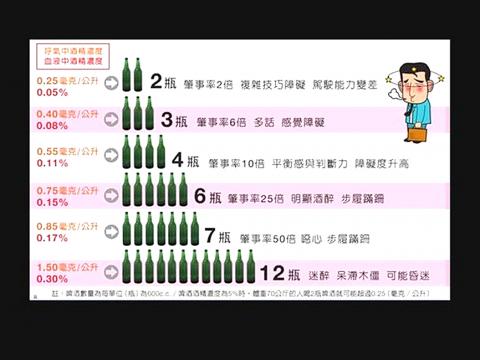The Ministry of Transportation and Communications supports the use of ignition interlock devices to curb drunk-driving recidivism, a source close to the ministry said.
The ministry’s apparent change in stance came after a meeting of the legislature’s Transportation Committee yesterday.
The committee was charged with conducting a preliminary review of proposed amendments to the Road Traffic Management and Penalty Act (道路交通管理處罰條例) ahead of a plenary session today.

Photo courtesy of Taichung City Police Department Traffic Police Corps
Lawmakers could push the amendments through their second and third reading today if negotiations between legislative party caucuses and ministry officials go smoothly.
The ministry had previously expressed reservations about making the devices mandatory equipment for drivers with a drunk-driving record, citing a lack of universally accepted specifications for the devices and high costs.
No such device exists for motorcycles and there is the possibility of drunk drivers asking a sober person to unlock the device for them, the ministry said in a report.
However, Minister of Transportation and Communications Lin Chia-lung (林佳龍) is considering supporting the devices’ use after lawmakers offered convincing arguments about their benefits to deter drunk-driving recidivism, the source said.
Ministry officials are drafting regulations for negotiations between party caucuses today, they added.
Democratic Progressive Party Legislator Hsiao Bih-khim (蕭美琴) cited EU research as saying that the devices have helped reduce drunk-driving accidents by 40 to 90 percent, adding that a US study shows that the devices reduced drunk-driving recidivism by 70 percent.
Parents in the US also have the devices installed in their vehicles to prevent their children from driving under the influence of alcohol, she said.
The Taiwanese government, on the other hand, kept delaying their use to deter drunk-driving recidivism, she added.
It is unacceptable that the ministry has used the device’s high retail price — NT$100,000 to NT$150,000 — to argue against their use, Lin said.
Similar devices can be bought for US$799 from Amazon.com, which is cheaper than what the ministry has reported, she said.
Vendors selling the devices in Taiwan might have quoted an excessively high price to the ministry, Lin said, adding that her proposed amendment would not target all drivers, but only drunk drivers, who would be obligated to pay for the cost of installing the devices on their vehicles.
Department of Railways and Highways Director-General Chen Wen-ruey (陳文瑞) said that the ministry does not oppose having the devices installed on vehicles, but added that they cannot be installed on motorcycles or older vehicles.
The issue required further research, Chen added.
Meanwhile, lawmakers yesterday agreed to double the fines for drunk bicyclists to between NT$600 and NT$1,200.
Cyclists who refuse to take an alcohol test would be fined NT$2,400.
The ministry proposed that lawmakers impose different fines for drunk drivers and motorists who refuse to take an alcohol test, saying that the fines for the former would remain between NT$15,000 and NT$90,000, while those for the latter would be raised to between NT$30,000 and NT$90,000.
In addition to installing ignition interlock devices and raising fines for drunk drivers, ministry officials are to negotiate with lawmakers on a range of proposed amendments today, including extending the minimum duration for which the government can suspend or revoke a drunk driver’s license or license plates, confiscating a drunk driver’s vehicles if they refuse to take an alcohol test and cause death or injury, and whether passengers riding with drunk drivers should be held accountable.

An essay competition jointly organized by a local writing society and a publisher affiliated with the Chinese Communist Party (CCP) might have contravened the Act Governing Relations Between the People of the Taiwan Area and the Mainland Area (臺灣地區與大陸地區人民關係條例), the Mainland Affairs Council (MAC) said on Thursday. “In this case, the partner organization is clearly an agency under the CCP’s Fujian Provincial Committee,” MAC Deputy Minister and spokesperson Liang Wen-chieh (梁文傑) said at a news briefing in Taipei. “It also involves bringing Taiwanese students to China with all-expenses-paid arrangements to attend award ceremonies and camps,” Liang said. Those two “characteristics” are typically sufficient

A magnitude 5.9 earthquake that struck about 33km off the coast of Hualien City was the "main shock" in a series of quakes in the area, with aftershocks expected over the next three days, the Central Weather Administration (CWA) said yesterday. Prior to the magnitude 5.9 quake shaking most of Taiwan at 6:53pm yesterday, six other earthquakes stronger than a magnitude of 4, starting with a magnitude 5.5 quake at 6:09pm, occurred in the area. CWA Seismological Center Director Wu Chien-fu (吳健富) confirmed that the quakes were all part of the same series and that the magnitude 5.5 temblor was

The brilliant blue waters, thick foliage and bucolic atmosphere on this seemingly idyllic archipelago deep in the Pacific Ocean belie the key role it now plays in a titanic geopolitical struggle. Palau is again on the front line as China, and the US and its allies prepare their forces in an intensifying contest for control over the Asia-Pacific region. The democratic nation of just 17,000 people hosts US-controlled airstrips and soon-to-be-completed radar installations that the US military describes as “critical” to monitoring vast swathes of water and airspace. It is also a key piece of the second island chain, a string of

The Central Weather Administration has issued a heat alert for southeastern Taiwan, warning of temperatures as high as 36°C today, while alerting some coastal areas of strong winds later in the day. Kaohsiung’s Neimen District (內門) and Pingtung County’s Neipu Township (內埔) are under an orange heat alert, which warns of temperatures as high as 36°C for three consecutive days, the CWA said, citing southwest winds. The heat would also extend to Tainan’s Nansi (楠西) and Yujing (玉井) districts, as well as Pingtung’s Gaoshu (高樹), Yanpu (鹽埔) and Majia (瑪家) townships, it said, forecasting highs of up to 36°C in those areas